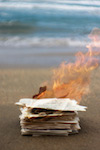 Don’t be surprised if you’re making bad art. Don’t be discouraged. And whatever you do, don’t stop. Keep making bad art. Not because you’re wrong about your self-evaluation — you might be producing some really awful stuff. But just because the thing you’re working on is a ripe mess doesn’t necessarily mean it’s time to stop working. On the contrary, that might be both the worst time and reason to quit. I think you need to make bad art in order to make anything better. I know that’s been the case for me.
Don’t be surprised if you’re making bad art. Don’t be discouraged. And whatever you do, don’t stop. Keep making bad art. Not because you’re wrong about your self-evaluation — you might be producing some really awful stuff. But just because the thing you’re working on is a ripe mess doesn’t necessarily mean it’s time to stop working. On the contrary, that might be both the worst time and reason to quit. I think you need to make bad art in order to make anything better. I know that’s been the case for me.
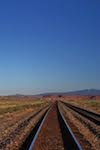 I reach the tracks and look both ways, like the sign says, just in case, though it’s difficult to imagine a train without a decent amount of noise to warn its approach.
I reach the tracks and look both ways, like the sign says, just in case, though it’s difficult to imagine a train without a decent amount of noise to warn its approach.
I take my time crossing the tracks.
I look down the east line and imagine what’s beyond the horizon, imagine myself on the Amtrak, one station away from the New Mexico border. Red lights flash, the bell ding ding dings, and my pace quickens.
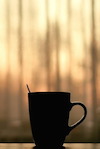 I am momentarily weightless standing here in the waning night, loose from sleep and freed by unfettered rest. Is it even right to be taking my emotional temperature this early in the morning? Shouldn’t I be telling myself how I feel? Brand new day! Clean slate! Expect to see God’s goodness! His mercies are new every morning! I do believe this. But some days it’s hard for the message to sink into my gut. I need extra time to dress myself in that truth.
I am momentarily weightless standing here in the waning night, loose from sleep and freed by unfettered rest. Is it even right to be taking my emotional temperature this early in the morning? Shouldn’t I be telling myself how I feel? Brand new day! Clean slate! Expect to see God’s goodness! His mercies are new every morning! I do believe this. But some days it’s hard for the message to sink into my gut. I need extra time to dress myself in that truth.
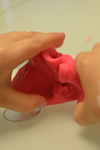 As much as motherhood has taken away — time to write, the ability to practice the piano without little hands taking over the keyboard ("Scooch, Mama”), the mental acuity to use polysyllabic words (or, some days, to finish sentences) — it has given me more. I have not lost myself in motherhood, as I had feared, but discovered myself. I don't just mean I've realized the beauty and joy of being a mother, but in and through motherhood I've grasped new ways of being creative. I learn creativity from my children, who are infinitely the same as and different from me; I learn creativity through my desire to create for them; I learn creativity simply by opening myself up to being something else.
As much as motherhood has taken away — time to write, the ability to practice the piano without little hands taking over the keyboard ("Scooch, Mama”), the mental acuity to use polysyllabic words (or, some days, to finish sentences) — it has given me more. I have not lost myself in motherhood, as I had feared, but discovered myself. I don't just mean I've realized the beauty and joy of being a mother, but in and through motherhood I've grasped new ways of being creative. I learn creativity from my children, who are infinitely the same as and different from me; I learn creativity through my desire to create for them; I learn creativity simply by opening myself up to being something else.
Repairing the World
Even with the best hopes, the truest motives, we will get hurt, because the world is very messy. Stepping in, even with responsibility born of love, is never neat-and-clean. To take up the wounds of the world will wound us, as it did God himself — which is why the heart of our vocation must be the imitation of the vocation of God. Nothing else can so form us, nothing else can so sustain us.
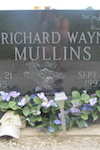 I used to desire, more than anything, to be useful to God. To be a good Christian. To change the world for Christ. To burn with the prophetic fire that lit Rich Mullins. But when my good works turned to ashes in my hands, I learned for the first time how precious it was to be wanted by God, apart from any usefulness I might have. Rich fought hard to grasp this lesson, and maybe if I’d been listening better I could have learned it from him while he was alive, but I doubt it: I had to fight for it on my own.
I used to desire, more than anything, to be useful to God. To be a good Christian. To change the world for Christ. To burn with the prophetic fire that lit Rich Mullins. But when my good works turned to ashes in my hands, I learned for the first time how precious it was to be wanted by God, apart from any usefulness I might have. Rich fought hard to grasp this lesson, and maybe if I’d been listening better I could have learned it from him while he was alive, but I doubt it: I had to fight for it on my own.
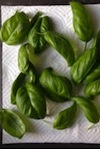 For the first time in my life, I did not know what was next. I only knew that it was time to lay low, rest, and wait. I was dried up inside and felt like I had very little to offer anyone around me. As it turns out, for the first three weeks of the year, I really didn’t have anything to offer as I was sick with a cold the whole time. I thought that I was going to start my sabbatical by doing all those things you never have time to do when you are working, like crafts and cooking and working out in the middle of the day. Nevertheless, my body was screaming at me to stop doing and start being. So I slept. A lot.
For the first time in my life, I did not know what was next. I only knew that it was time to lay low, rest, and wait. I was dried up inside and felt like I had very little to offer anyone around me. As it turns out, for the first three weeks of the year, I really didn’t have anything to offer as I was sick with a cold the whole time. I thought that I was going to start my sabbatical by doing all those things you never have time to do when you are working, like crafts and cooking and working out in the middle of the day. Nevertheless, my body was screaming at me to stop doing and start being. So I slept. A lot.
 I believe that God honors our questions just as my dad honored mine. I believe that God stays with us, even when prayers and songs seem flimsy as paper angels. I believe that it helps to leave the hall light on when the questions come faster than morning. And I keep asking those questions because somewhere in the asking I find I am not answered but I am heard.
I believe that God honors our questions just as my dad honored mine. I believe that God stays with us, even when prayers and songs seem flimsy as paper angels. I believe that it helps to leave the hall light on when the questions come faster than morning. And I keep asking those questions because somewhere in the asking I find I am not answered but I am heard.
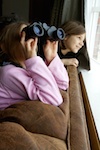 180 days. Four hours of instructional time per day. These are the only requirements dictated by the state of Tennessee. I was free to use curriculum or not to use curriculum. I could test or not. Unschooling appealed to me because it felt more sustainable; without a rigid plan I would be less likely to burn out. Even if it didn’t work, one year of unschooling wouldn’t kill us. And maybe it would be exactly what we needed to recalibrate and de-stress.
180 days. Four hours of instructional time per day. These are the only requirements dictated by the state of Tennessee. I was free to use curriculum or not to use curriculum. I could test or not. Unschooling appealed to me because it felt more sustainable; without a rigid plan I would be less likely to burn out. Even if it didn’t work, one year of unschooling wouldn’t kill us. And maybe it would be exactly what we needed to recalibrate and de-stress.
Waters of Refreshing and the Joy of the Heirloom Tomato
The watering came in unexpected ways. Sometimes the Lord’s refreshing comes through a change of scenery — the resting place of a vacation, a Sabbath day of ceasing our worry and work, a retreat at Laity Lodge. Sometimes it comes through a change of countenance — we are literally righted from the inside out, brought to clarity, given new perspective and strength. Sometimes we’re made compassionate again, given a new imagination and concern for people’s needs, or a renewed sense of meaning and purpose.
 For me, the empty pages tell the story of my life becoming occupied with things I never suspected would lead me from the corner booth at the coffee shop into the consuming risk and mess and joy and inertia of marrying a woman who beckons me out of isolation, of raising four beautiful and uniquely complex children, of moving from one city to another, of living in a community, and of following a vocation which, ironically, involves more writing than ever.
For me, the empty pages tell the story of my life becoming occupied with things I never suspected would lead me from the corner booth at the coffee shop into the consuming risk and mess and joy and inertia of marrying a woman who beckons me out of isolation, of raising four beautiful and uniquely complex children, of moving from one city to another, of living in a community, and of following a vocation which, ironically, involves more writing than ever.
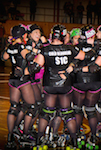 Most days of the year, I wear worn blue jeans, a soft grey T-shirt, and old tennis shoes — a sharp contrast to my derby attire. I like grey: it suits my personality and my desire to keep things safe and simple. But looking back on my collective experiences, I recognize there is a hot-pink narrative thread that runs throughout my story, stringing together all of the things that thrill me most in this world. It connects me to an adventure that is more exciting than one I have envisioned for myself.
Most days of the year, I wear worn blue jeans, a soft grey T-shirt, and old tennis shoes — a sharp contrast to my derby attire. I like grey: it suits my personality and my desire to keep things safe and simple. But looking back on my collective experiences, I recognize there is a hot-pink narrative thread that runs throughout my story, stringing together all of the things that thrill me most in this world. It connects me to an adventure that is more exciting than one I have envisioned for myself.
 In this world where news of torture and death runs like a ticker through my day, I’m realizing in a new way that I must learn to pray. I must learn to sit in silence with a God who is all-powerful and all-loving in the mystery of horrendous suffering. I must learn to lift up my sisters and brothers without ceasing. I must learn to pray ordinary prayers for them in my small way and believe that God makes those prayers matter.
In this world where news of torture and death runs like a ticker through my day, I’m realizing in a new way that I must learn to pray. I must learn to sit in silence with a God who is all-powerful and all-loving in the mystery of horrendous suffering. I must learn to lift up my sisters and brothers without ceasing. I must learn to pray ordinary prayers for them in my small way and believe that God makes those prayers matter.
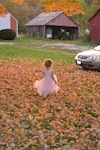 There is a tension here that my husband and I find important as parents. As our life on a farm begins to mirror the lives of some of our ancestors who had closer connections to death, food, seasons, and the rhythm of days, our family has been given many opportunities to experience both a spiritual and a literal darkness that cannot be eliminated. We try not to shield our children from every hurt and pain. But we also encourage them in their imaginations, giving them a framework for hope and allowing them to “escape into” the longing for the not-yet that literature can bring.
There is a tension here that my husband and I find important as parents. As our life on a farm begins to mirror the lives of some of our ancestors who had closer connections to death, food, seasons, and the rhythm of days, our family has been given many opportunities to experience both a spiritual and a literal darkness that cannot be eliminated. We try not to shield our children from every hurt and pain. But we also encourage them in their imaginations, giving them a framework for hope and allowing them to “escape into” the longing for the not-yet that literature can bring.
 yet we have in our soil
yet we have in our soil
an inexhaustible mine
of true wealth,
the foundation of a nation’s
greatness,
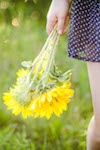 Sometimes it’s a shoulder or a hand combing through hair. Always it’s a simple gesture or posture that says something about the person that the whole face never could. And I love that. I love the faceless portrait.
Sometimes it’s a shoulder or a hand combing through hair. Always it’s a simple gesture or posture that says something about the person that the whole face never could. And I love that. I love the faceless portrait.
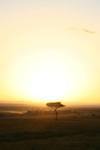 I watch the world through tinted glass — and often don’t really see it. I close the windows to control the climate and keep the gnats — and the world — at a distance. I drive past the same homeless woman walking our sidewalks several times a week, and have I ever stopped the car to chat? Only twice in nine years. My car is large and strong, and it insulates me from the world like an armored vehicle.
I watch the world through tinted glass — and often don’t really see it. I close the windows to control the climate and keep the gnats — and the world — at a distance. I drive past the same homeless woman walking our sidewalks several times a week, and have I ever stopped the car to chat? Only twice in nine years. My car is large and strong, and it insulates me from the world like an armored vehicle.
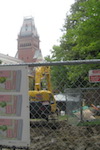 I am always seeking to hone my technique, to generate new and creative ideas, to find a different way of looking at the world. But like the construction workers, I have to build on what’s already there. I have to strike a balance, uneasy though it may be, of honoring the strength of the old, and creating a little chaos to bring in the new.
I am always seeking to hone my technique, to generate new and creative ideas, to find a different way of looking at the world. But like the construction workers, I have to build on what’s already there. I have to strike a balance, uneasy though it may be, of honoring the strength of the old, and creating a little chaos to bring in the new.
 I could probably find a way to heat treat everything else as well. Not only my food, but my home and my relationships. I could boil my garden vegetables, throw money at my old house, distance myself from friends and family and neighbors. I could fence my children in with a hundred thousand rules.
I could probably find a way to heat treat everything else as well. Not only my food, but my home and my relationships. I could boil my garden vegetables, throw money at my old house, distance myself from friends and family and neighbors. I could fence my children in with a hundred thousand rules.
Then they would be safe. Then they would be contained. Then they would no longer have the power to break my heart.
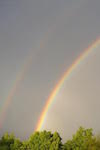 It was a few weeks into the class that I suddenly felt as though I was in the ocean, treading water with seasoned and well-equipped scuba divers. The language was the water surrounding me, warm and inviting, salty and buoyant but dark below. It was the darkness that drew me. As much as I tried to get in touch with the text, with the loss of Eden, I felt drawn to the darkness below and I swam in that.
It was a few weeks into the class that I suddenly felt as though I was in the ocean, treading water with seasoned and well-equipped scuba divers. The language was the water surrounding me, warm and inviting, salty and buoyant but dark below. It was the darkness that drew me. As much as I tried to get in touch with the text, with the loss of Eden, I felt drawn to the darkness below and I swam in that.
















